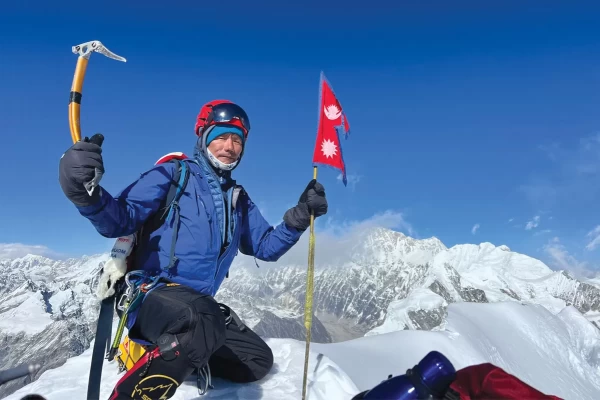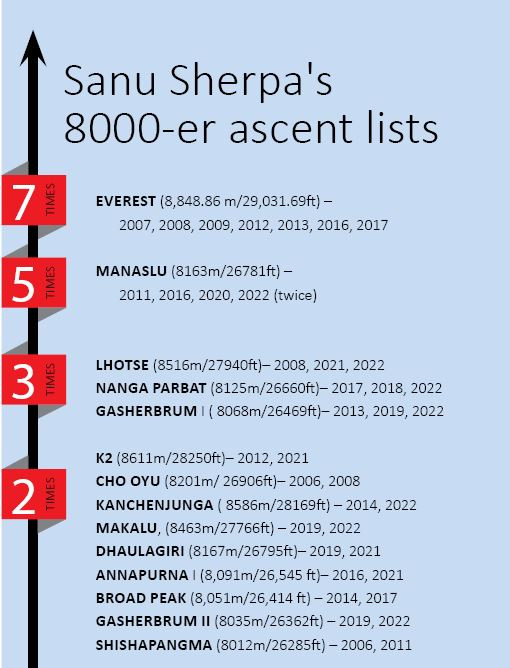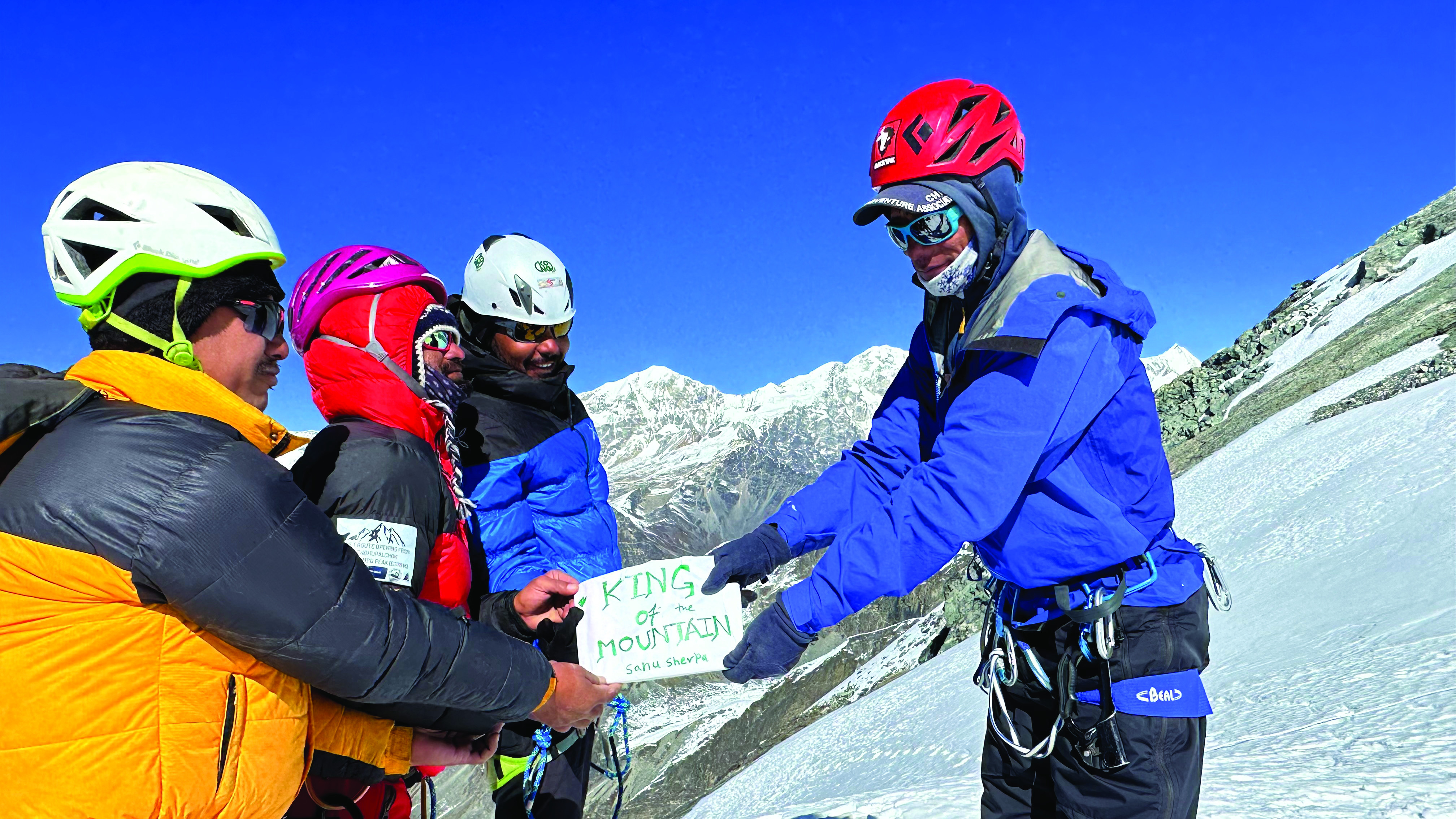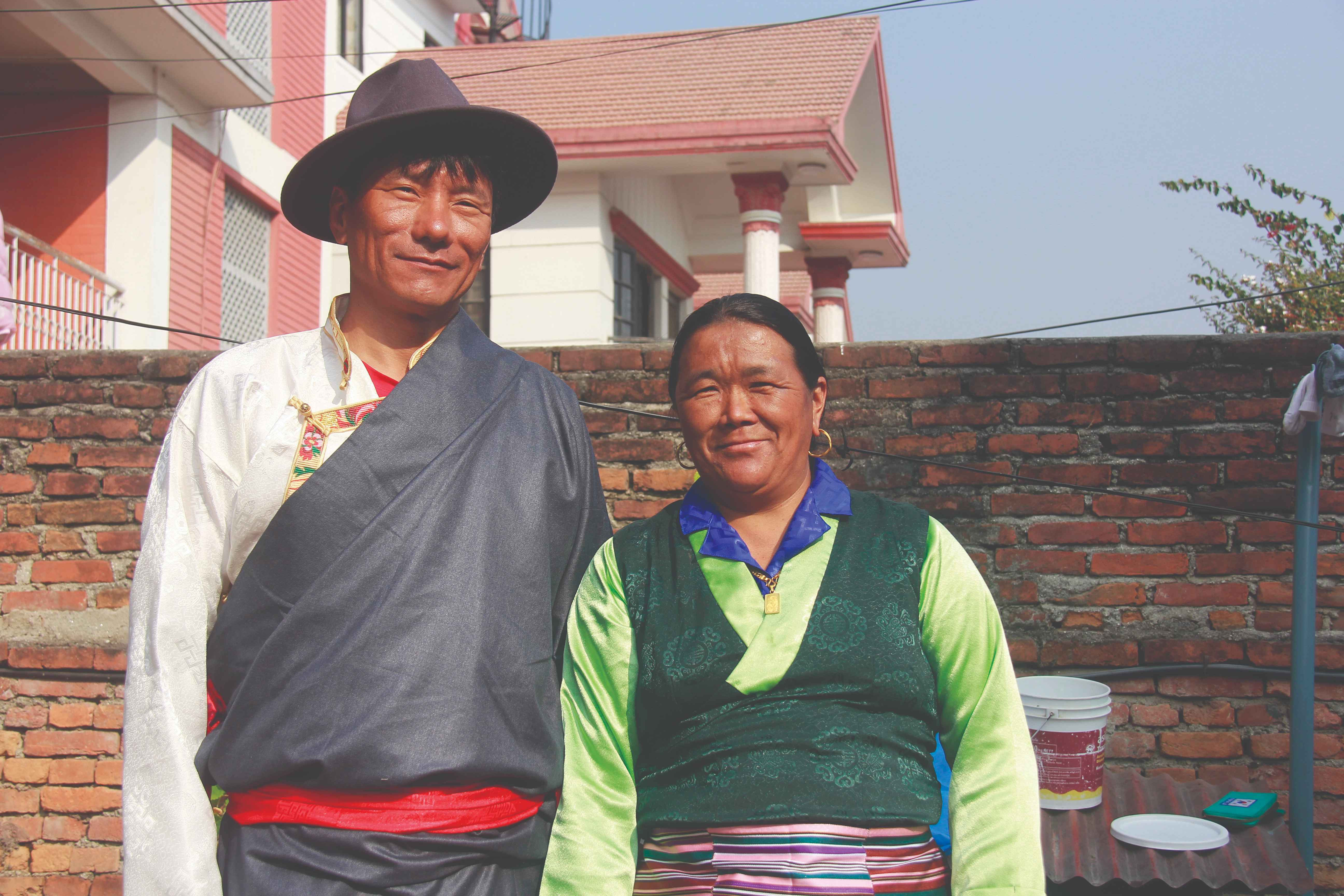
Born in Walang village of Sankhuwasabha in the Makalu region, Sanu Sherpa, 47 was raised carrying loads. At 13, he had gone to Hile Bazaar to fetch salt. It takes half a month to return from the nearest salt market. Sanu has twice taken the same route following ancestors' tradition of transporting salt to his home village.

The majority of his childhood days also spent herding cattle and helping with chores around the house. As a result, he struggled with his schooling, attending classes only about twice a week. And stopped going to school by grade three.
Sanu Sherpa As A Herder And A Porter Boy
Sanu says that he must have been about 15 or 16 when he took his first porter job. Sanu was mesmerized by the trekking bags, boots, and other outfits that the guides wore on the expedition, while he and the other village boys carried loads in tattered clothes and worn-out shoes. He wondered, "How wonderful it would be to wear such nice things!".
Sanu was granted to carry half loads (30 kg) for the first time. Those days, porters were paid Rs. 200 or $1.5 a day as wages, so Sanu received Rs. 1200 or $9 for the six-day work. He gave his parents all the money he earned and got Rs. 50 or $0.33 as pocket money. It was a huge blessing to get loads back then.
 Trekking and expeditions are seasonal activities in Nepal, and so is the porter's job. Sanu continued to herd livestock in the mountains and highlands and he missed the tourist work several times. He longed for a better future because of the challenging life in the village. Leopards occasionally attacked his sheep and would kill 8-10 livestock in a single attack. Cattle were often lost and he would be reprimanded by his father for the missing sheep. "At such times, I wished to flee my village," he says, adding "But with no money in my wallet and torn pants, I didn't have the guts to leave."
Trekking and expeditions are seasonal activities in Nepal, and so is the porter's job. Sanu continued to herd livestock in the mountains and highlands and he missed the tourist work several times. He longed for a better future because of the challenging life in the village. Leopards occasionally attacked his sheep and would kill 8-10 livestock in a single attack. Cattle were often lost and he would be reprimanded by his father for the missing sheep. "At such times, I wished to flee my village," he says, adding "But with no money in my wallet and torn pants, I didn't have the guts to leave."
Marriage And Leaving Home For Work
Sanu married at the age of 17 as was the tradition those days. Three years later, He got separated from his parents, following the village's practice. He received a modest plot of arable land as part of the family allotment, along with roughly a dozen sheep and goats, but it was not enough for his growing family. In the early 2000’s, most people from his home village used to go to Darjeeling, India, seeking better job opportunities. But Sanu dreamt of going to Kathmandu, the capital city of Nepal. His wife had borrowed NRs. 1,500 from an elderly local granny. He kept Rs 1,000 and left his wife the rest for home expenditures; he then left the village at the age of 31. It usually takes two days to walk from the village to the nearest town of Khandbari. He reached there in a day and walked another day to Hile Bazar to catch a bus to Kathmandu.
Although there was flights from Tumlingtar to Kathmandu, he had little money so he opted for a night bus and spent whole night driving. For a man from a remote village, Kathmandu was a large city. It was difficult for him to distinguish places and people. As he arrived in the city, he got in touch with a relative who fed and sheltered him in his early days in the city. He still appreciates their generosity to this day. After some months he considered moving and found a room of his own. He then borrowed Rs. 5,000 from the relatives, promising to pay them back as soon as he earned money. As his relatives did not have money of their own, Sanu remembers they had borrowed it from other sources.
Mountain's Journey - From Porter To Mountaineer
Sanu with his friend looked for jobs by knocking on doors of trekking companies throughout the off-season. He eventually secured a position as a porter for a trekking company that catered to British tourist groups. The first task was a journey through Larkey Pass to the Manaslu region. He was given almost 40 kilograms of load to carry. Due to poor weather conditions and on-going snowfall along the trail, his team were unable to cross Larkey Pass and were forced to return to camp. “As the strongest of all the porters, I found it easy to carry the hefty burden, " Sanu recounted. Other porters were unable to move forward so they left the loads along the trail and returned back to the camp empty-handed. Meanwhile, Sanu gathered all the abandoned loads and reached the camp. At that time, Ang Phurba, a guide, noticed Sanu's diligent work, and was impressed by his labor. He then became the guide's favorite.
Eventually, Sanu was hired as a porter by the same guide for the next two months and recommended to other guides and companies as the "muscular and diligent man." Thus, Sanu entered the sphere of tourism. Trekking Camp Nepal, a trekking company, owned by Wangchu Sherpa, was frequented by many Korean tourists, Sanu worked there for nine years. Sanu says he would always honor and remember Wangchu. "He is like my Godfather, he helped me to get employment when I first started out." Wangchu later sent Sanu to the Island Peak expedition with a sizable kitchen group. "I carried the entire weight of equipment (crampon, boot, ice axe, ropes etc.) all night in a large doko (bamboo basket) to base camp." Afterward, the same employer hired him 5–6 times for Annapurna and ABC regions.
-1.jpg) In 2006 Wangchu told Sanu to get a passport. He realized its purpose only later when his boss told him to go with Korean clients for the Cho Oyu expedition from the Chinese side. He expressed amazement and said, "It was astonishing, and I was so thrilled when Wangchu instructed me to go to Cho Oyu! How could a porter like me get a chance to climb an 8,000-meter peak so soon?" The proposition seemed so unbelievable to him.
In 2006 Wangchu told Sanu to get a passport. He realized its purpose only later when his boss told him to go with Korean clients for the Cho Oyu expedition from the Chinese side. He expressed amazement and said, "It was astonishing, and I was so thrilled when Wangchu instructed me to go to Cho Oyu! How could a porter like me get a chance to climb an 8,000-meter peak so soon?" The proposition seemed so unbelievable to him.
On the expedition were two Sherpas and 19 Korean climbers. Inexperienced in large mountains compared to his companions, Sanu sought help from other Sherpas. He learned how to use climbing gears to scale higher mountains. He offered tea and snacks to Sherpas in favor of their knowllege and for using their equipment on bigger mountains and other technical skills. "I imagined that 8K peaks are unique and require specialized knowledge. But technical proficiency, however, was not different from other smaller summits," he says "The expedition departed in the spring of 2006. Although the foreigners appeared to be tall and robust, Sanu remarked that they lacked sufficient strength. As the ascent got underway, one after another, the Korean climbers fell ill and gave up."
.jpeg) Out of three teams, Sanu was a member of Team A. "My responsibility was to transport their gears and ascend alongside them," Sanu recalled. As each squad ascended, they experienced altitude sickness, and had to descend. He spent 5 days at camp-3 before returning to base camp, determined to reach the summit at all costs. Three climbers from team C arrived on the third day with a plan to reach the summit that evening. Next morning, he fell into a deep sleep and was late to wake up.
Out of three teams, Sanu was a member of Team A. "My responsibility was to transport their gears and ascend alongside them," Sanu recalled. As each squad ascended, they experienced altitude sickness, and had to descend. He spent 5 days at camp-3 before returning to base camp, determined to reach the summit at all costs. Three climbers from team C arrived on the third day with a plan to reach the summit that evening. Next morning, he fell into a deep sleep and was late to wake up.
He glanced up and saw two people ascending the mountains. Worried, he put on his shoes and crampons right away, and hurriedly climbed chasing the two climbers, believing that they were his clients. As he caught them up, they were Japanese, not Koreans. Then he immediately descended, and checked his client’s tent. He was shocked to see his Korean clients inside, sound asleep.
"I should have checked the tent before climbing up, rushing up was painful in every way, the three hours was worthless," he regretted. Later that night, they began their ascent. Finally, the team arrived at the summit on May 1 around 8:30 am.
At 32 years old Sanu completed his first ascent of an eight thousand peak in 2006. Happiness knew no bounds for him, he said, "It was a moment of great joy to reach the first 8K summit." Later in the same year he climbed Shishapangma with other Korean group. Sanu continued other ascents one after other.
The First Everest Summit of Sanu Sherpa
In 2007, Sanu joined a group of 16 foreign climbers with 7 Nepali Sherpa teams to climb Mount Everest (8848.86 m). He had eagerly awaited his dream of climbing the world's highest peak. And he also knew that Everest climbers were in high demand in market. He had a positive outlook, high morale, passion and energy to reach the summit. Finally, he reached the Mt. Everest top in 2007. It took nearly 50 days to for the expedition. For him, ascending mountains was an easy task despite hardship, fatigue, or risks associated with climbing. These days, Sanu is a highly celebrated and demanded mountain climbing guide. Expedition companies are always willing to hire him.
You may also like: Everest Man - Kami Rita Sherpa
His Double 14 Peak Ascent Records
Because of his records ,foreign expedition leaders often make an offer to Sanu good amount of money for an expedition. "I never intended to scale peaks for records,” Sanu says, "I am just doing my job for livelihood." He became the third Nepalese to climb fourteen 8000-meter peaks between 2006 to 2019, and the 41st person in the world. Before him, only two Nepali climbers, Mingma Sherpa and ChhangDawa, had scaled 14 peaks. On July 21st 2022, after climbing Gesherbrum II, He created history by double summiting 14 peaks.
After the controversy on Manaslu’s real and fore summit surfaced, he quietly summited the real summit peak twice in five days in recent Autumn 2022.
When asked whether he has any plan to hold a tripple 14 peak summit, he shakes his head, "No". Two things that concern him are the garbage heaps and the impact of climate change in the mountains. He urges the government to pay attention to the future of mountain workers, their social security, insurance, accidental loss and other needs. In his 17 years of alpine career, he conquered all 14 highest peaks two times and scripted his name in mountaineering history. So far, none has achieved this rare title on this planet. He surviv-es with his wife, Kidiki Sherpa, four daughter and a son. The shy, modest and soft-spoken village herder who turned into a legendary mountaineer, Sanu Sherpa’s journey has not stopped yet. “I will keep climbing mountains,” he said, “That’s the only skill I achieved so far.”




